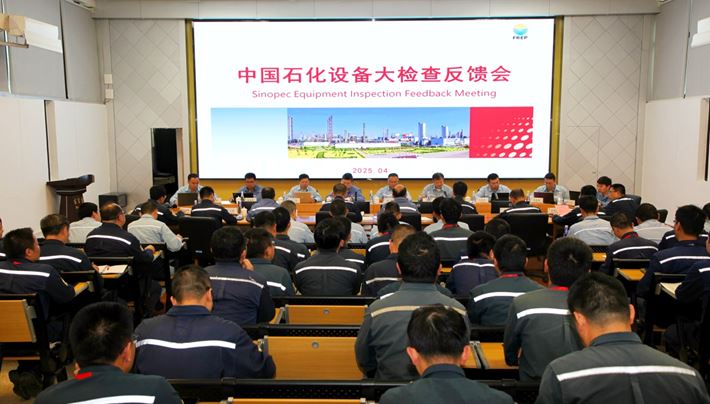Sinopec Conducted an Equipment Inspection on the Company
On April 16, the Company held the kickoff meeting for Sinopec-led Equipment Inspection. Chen Gang, Sinopec Equipment Inspection Team Lead and Deputy General Manager of Sinopec Jinling Petrochemical Corporation, members of the team, Lin Xu, Suchart Phowatthanasathian, and Li Ji, OOP members of the Company attended the meeting. Ren Gang, Deputy Leader of the inspection team and Manager of Equipment Room of Sinopec Refining Department, presided over the meeting.
During the meeting, Chen Gang conveyed Sinopec’s specific arrangements, inspection standards, and work plans for this equipment inspection, and elaborated on key inspection areas such as disciplines, management, risk assessment, and storage tanks. He stated that during the inspection, the team would verify employees’ job performance and emergency response abilities through conducting exams and emergency drills for equipment professionals to ensure the thoroughness and effectiveness of the inspection. Lin Xu provided an overview of the Company’s equity structure, scale of units, organizational framework, management system, and operational status.
The inspection team communicated with the Company’s personnel from relevant disciplines and conducted on-site inspections on departments and business teams of the Company.
On April 19, the Company held the Sinopec-led Equipment inspection Summary Meeting.Chen Gang briefed on the inspection results, FREP work highlights and major inspection findings, and provided recommendations for the Company’s equipment management across five areas: talent team building, management system integration, information technology development, 5S (Sort, Set in order, Shine, Standardize, Sustain) management, and risk control levels.
Chen Gang emphasized the need for full participation and attention to rectifications. Leaders of the Company should organize full staff involvement, enhance the urgency and sense of responsibility for subsequent rectification efforts, work on rectifications and management, improve the overall awareness and level of equipment management, and take rigorous, meticulous, and practical steps to ensure subsequent inspection and rectification efforts are in place. Secondly, efforts should be made to take lessons and identify similar issues in making rectifications. For the problems found during the inspection, specific rectification measures should be formulated with responsibilities and deadlines clarified, strengthening the supervision and tracking of the rectification process to ensure effective resolution of problems, prevent recurrence of similar problems, and enhance overall task performance. Thirdly, science-based incentives should be developed to promote rectifications. The focus of assessment should be on the effectiveness of problem rectification, encouraging all departments and business teams to achieve thorough inspection and complete rectification. For business teams and individuals with inadequate rectification efforts, poor or perfunctory performance, strict accountability and rigorous assessment should be enforced.
Zhao Tianxing, General Manager of FPCL, expressed sincere gratitude to the inspection team for their hard work. He pointed out that the inspection team systematically conducted a comprehensive “health check” on the equipment management of FREP, not only proposing improvement and enhancement measures for subsequent equipment management of FREP but also indicating the direction for the equipment management work of FPCL. He demanded that FREP take the equipment inspection as an opportunity, take lessons and identify similar issues in making rectifications with a resolute attitude and pragmatic style, ensuring that every problem is rectified and every matter is settled, to maximize the consolidation and expansion of the inspection team’s results, and continuously improve equipment management. FPCL should transform the valuable experience of the inspection team into a driving force for improving equipment management, continuously strengthen the foundation of professional skills, constantly improve system construction and execution, enhance the supervision and management over the entire process of affiliated enterprises, fully leverage the functions of “supervision, coordination, and service,” and fully promote the better and higher quality development of FPCL.
Lin Xu, Acting President of the Company, made a statement. He stated that FREP will work on the rectifying problems, with a high sense of responsibility and mission, precisely close the capability gaps, synergize efforts and go all out to strengthen the foundation of equipment management, driving the Company’s equipment management work to a new level. He demanded that, firstly, FREP should strictly implement the Group Company’s equipment management requirements, that leaders at all levels should enhance their awareness, lead by example, and encourage full participation, and that meticulous arrangements and refined measures should be put into place according to the management requirements based on the “6D Gap Closure Table”, ensuring that problems identified during the inspection are resolutely rectified to achieve a closed loop. Secondly, FREP should make efforts to continuously enhance system effectiveness, and effectively inherit and absorb the experience and requirements of the Group Company in specialized management, thus to enrich and improve the reliability system, with a focus on elevating the fundamental management of equipment. Thirdly, FREP should make efforts to vigorously strengthen the "Three Basics" work, proactively promote the effectiveness of 5S management, accelerate improving equipment management informatization, absorb and learn from the best practices and experiences of sister organizations, and strengthen the basic skills training of personnel, thus to comprehensively improve the professional level of equipment management.
During the meeting, the inspection team provided detailed reviews across six disciplines: Comprehensive Management, Rotary Equipment, Static Equipment, Electrical, Instrument & Control, and Thermal Power, and proposed rectification suggestions and measures.
It was reported that seven inspection teams were established respectively targeting disciplines including Comprehensive Management, Electrical, Instrument & Control, Rotary Equipment, Static Equipment, and Thermal Power. Experts across equipment disciplines within the system would conduct inspections and guidance on departments and organizations of the Company through field inspections, document reviews, symposiums, and reporting sessions. (Zhang Lei)




